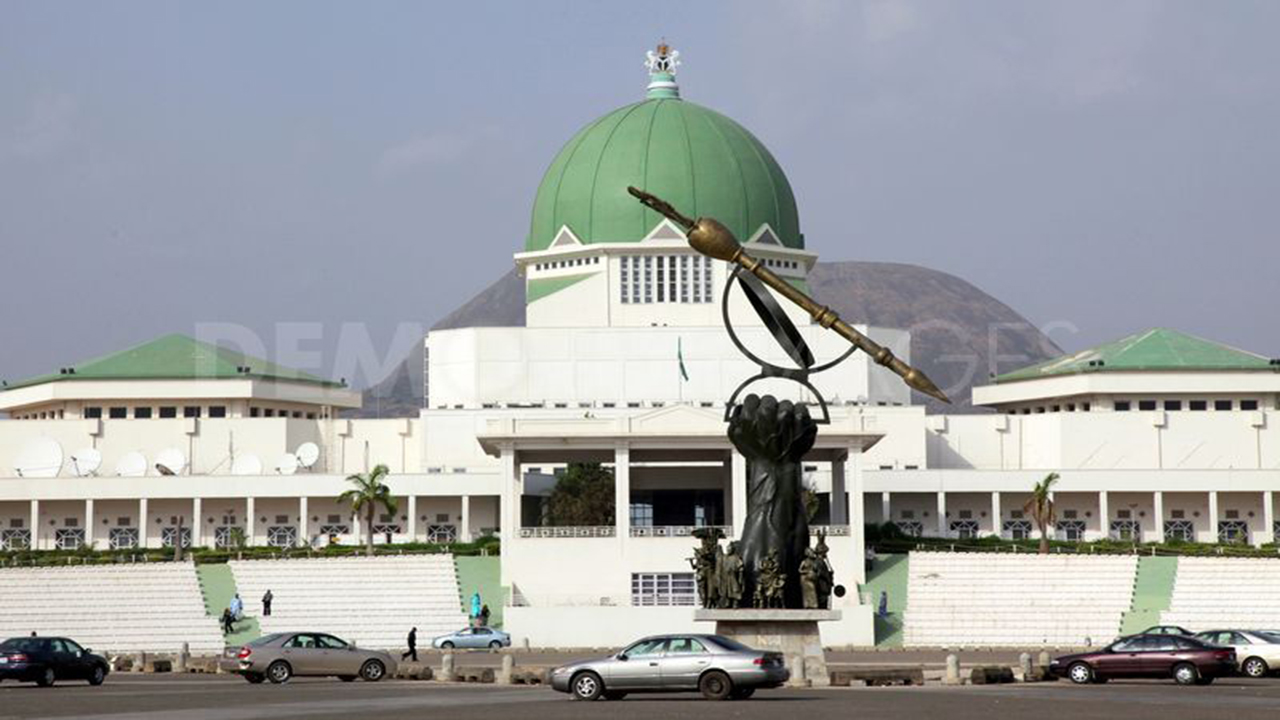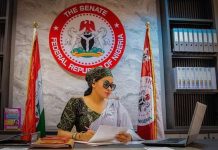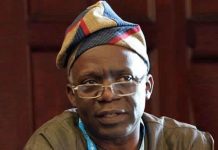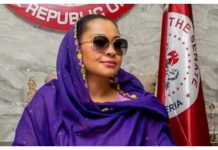In Nigeria, we’re obsessed with tokenism: we promote and support women and youth simply to appear “modern”, or because the candidates themselves have an air of progressivism. But too many people of all ages, of both genders, masquerade as reformists to hide their deeply conservative, pro-status quo nature. So many powerful women have had the opportunity to fight to improve the condition of society’s most disadvantaged people, either as ministers, senators, or in other political capacities, yet how many of them are known for their policies in favour of socio-economic justice?
Business advantages
Many men and women of the political class simply use the opportunity to corner further business advantages for themselves, or in the case of women, to pose as activists and receive awards from various platforms they patronise. Most Nigerians can’t identify their local representatives, and I’ll wager most people have never visited their constituency office.
Beyond focusing on the President, so many individuals in the political arena have a more direct effect on our lives; which is why real change is so difficult to bring about if we keep electing non-performing individuals at the local level, (or refusing to monitor) the activities (or lack thereof) of local government chairmen, members of state houses of assembly, senators and members of the house of representatives.
A number of individuals running for President in the 2020 US elections are current members of Congress. In Nigeria, Senate presidents and speakers of the House routinely aspire to become presidents, but beyond their personal ambition, how successful have they been at improving the standard of living in Nigeria?
It’s unfortunate the average Nigerian remains uninformed and still doesn’t fully understand what the people they vote for ought to be doing: the political class encourages this so no one is armed with the right information or ideas to adequately question them.
Beyond blaming the President for not being able to be everywhere at once, we need to focus on the Senate, a key institution in any democracy. Nigeria’s next Senate president must be someone who is ready to work with the executive, not be a hindrance to its policies (especially because the APC has a majority), and to produce results for Nigeria as a whole.
We need to first of all reflect over the concept of what an “economy” really is. According to Investopedia, “the economy is the production and consumption activities that determine how scarce resources are allocated in an area. It includes everything related to the production and consumption of goods and services”.
Conflict over the allocation of scarce resources is the reason behind violence and poverty which affect each other in a sort of feedback loop. Nigeria is not a country which works for everyone; on the contrary, it is a country where the rich and the well-connected are allowed to ride roughshod over the laws of human decency and compassion, aided, in many ways, by a Senate which isn’t alive to its responsibilities. Budgets, for example, show a nation’s commitment to providing opportunities for all, and investing in all citizens, not just a few.
Nigerian budget scandals, “padding”, excessive allowances for some of society’s most unproductive elements while depriving critical sectors of funds, show the fundamental dysfunction of our society. Can any President succeed without a National Assembly that is pro-people? No. And what are we ready to do about constituency projects, knowing much of the funds earmarked for them have allegedly gone “missing” over the years and the projects themselves are rarely traceable or completed? The concept of economic justice is still too foreign to us: we are more capitalist than the nations who invented the concept.
Our senators should be working to safeguard the rights of the common man; we need to ask ourselves where they fit in the plan to create an economy that works for all, where everyone can produce and consume goods at different levels. Too often, our concept of a thriving economy is reduced to putting a lot of money into the hands of a few people who are granted tax breaks and allowed to have a monopoly of production, driving prices up, and pushing competitors out. Where is the legislation to protect against this?
Structural changes
Rarely any sweeping, structural changes emanate from the Senate, which neither connects with the will of Nigerians for lasting change, nor recommends or puts forward the legislation to enable or support this. Many of the issues discussed on the senate floor are based on outdated understanding or barely concealed private interests which have a negative impact on working class people’s ability to create and consume wealth. Injustice is the cornerstone of our society, it is written into the way we discuss important issues and pretend to tackle them.
Our system is rigged to defend the interests of the powerful, which is why even when politicians are literally caught doing wrong, there are so many hurdles towards prosecuting them. The greatest of all these hurdles is our own unwillingness to support justice: we prefer ethno-religious prejudice. Can we get National Assembly leaders who are dogged fighters for the common man? Is that too much to ask?
Bola Tinubu vs. Bukola Saraki
SOME people assumed that because Kwara said “o to ge” (enough is enough), the people of Lagos would answer “freedom” and reject Asiwaju Bola Tinubu’s influence in Lagos politics. Nigerians are so much more discerning than the elite commonly think.
While Bola Tinubu has mentored countless individuals who are now eminent leaders at local and national levels; Bukola Saraki is not known for such a feat. Tinubu currently holds no national political office but remains not just relevant but central to our politics, perhaps because of his wide network and relationships. Tinubu is responsible for introducing proven performers and technocrats.
How many people would partner with the opposition, those opposed to the party they claim to belong to, to foist themselves into power, and hope to survive for longer than a short period of time? Indeed, when you prove that you have no real loyalty to any particular group, that you’re ready to work against those who’ve helped you, etc., success is short lived. 2019 saw many supposedly “indestructible” giants fall. Their common crime? Arrogance, treachery and detachment from reality.
Nigerian Army
MANY Independent National Electoral Commission, INEC, offices were burnt down. The latest was the INEC office in Ebonyi State where unidentified thugs set fire to sensitive materials and structures. The army accused politicians of dressing their thugs as soldiers to cause confusion and perpetrate violence.
Colonel Sagir Musam, the Nigerian Army’s spokesman said: “the Army understands that most civilians caught in the callous onslaught of these murderous thugs might not be able to distinguish between genuine soldiers and impersonators, especially when they are armed with military-type weapons.”
He further revealed that a number of “fake soldiers” were apprehended and confessed to being sponsored to disrupt the elections. Prosecuting the politicians who fund unrest all over the country, must be swift, to set an example: virtually every election cycle, the level of political desperation seems to increase, based on politicians’ desire to gain or retain positions at all cost. Human life means nothing in Nigeria, given what’s at stake: is it time to discuss making political office less attractive?
How many of our current officials would vote to reduce the pay packages and rewards associated with government jobs?
Tabia Princewill is a strategic communications consultant and public policy analyst. She is also the co-host and executive producer of a talk show, WALK THE TALK which airs on Channels TV.







